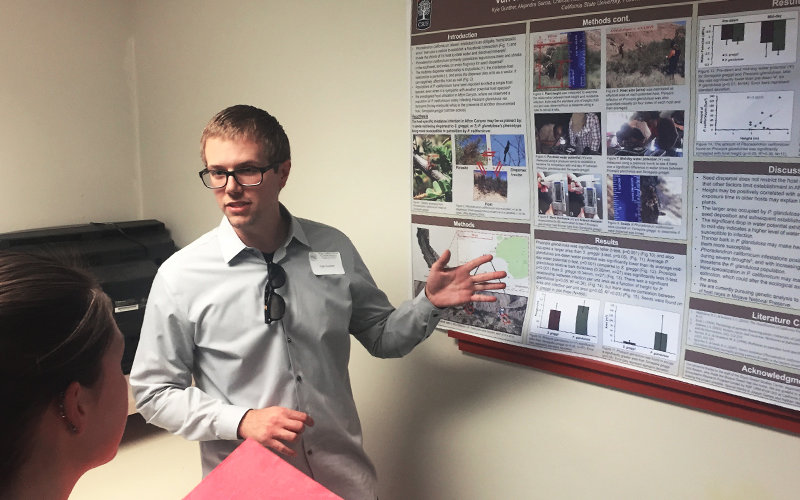
Three Cal State Fullerton students received awards for their outstanding research presentations at the recent Society for Advancement of Chicanos/Hispanics and Native Americans in Science (SACNAS) — The National Diversity in STEM Conference.
College of Natural Sciences and Mathematics undergraduates Kyle Gunther and Nhu Vu, and graduate student Nathan Johnson, competed with students from universities across the country, including those from Harvard, MIT, Yale, Brown, CSU and UC campuses.
Gunther, a biological science major, received the undergraduate student poster presentation award in life science-botany for his work on fennel. The research is co-authored with fellow undergraduate researcher Tilly Duong and faculty mentor Joel K. Abraham, associate professor of biological science.
The study found that the herb, which is not native to California, yet widespread in the state, may be allelopathic — meaning it releases chemicals into the environment that inhibit the growth of other plants, said Gunther, a scholar in the National Science Foundation-funded Southern California Ecosystems Research Program. The students tested the hypothesis that fennel is allelopathic by growing three California native plants in different soil treatments, with or without previous fennel growth or fertilizer added.
Vu, a biochemistry major, was recognized with the undergraduate student poster presentation award in chemistry-analytical chemistry for her research on how aerosol particles, such as sea salt or desert dust, interact with light. Similar to greenhouse gases, aerosol particles in the atmosphere can absorb and re-emit radiation coming from the Earth’s surface; the extra radiation emitted back has an impact on climate. Vu’s study, with faculty mentor Paula Hudson, associate professor of chemistry and biochemistry, is working toward a method to improve scientists’ ability to predict climate changes due to aerosol particles.
Johnson received the graduate student oral presentation award in mathematics and statistics-applied mathematics. Johnson, who is pursuing a master’s degree in mathematics-applied mathematics, is focusing his research on a math model to describe and predict domestic political conflict, using Colombia and Venezuela as examples. “Such models, by signaling expected increases in political conflict, would help inform and prepare policymakers to react accordingly to conflict proliferation both domestically and internationally,” said faculty mentor Laura Smith, assistant professor of mathematics.
The national conference was held this fall in Long Beach.